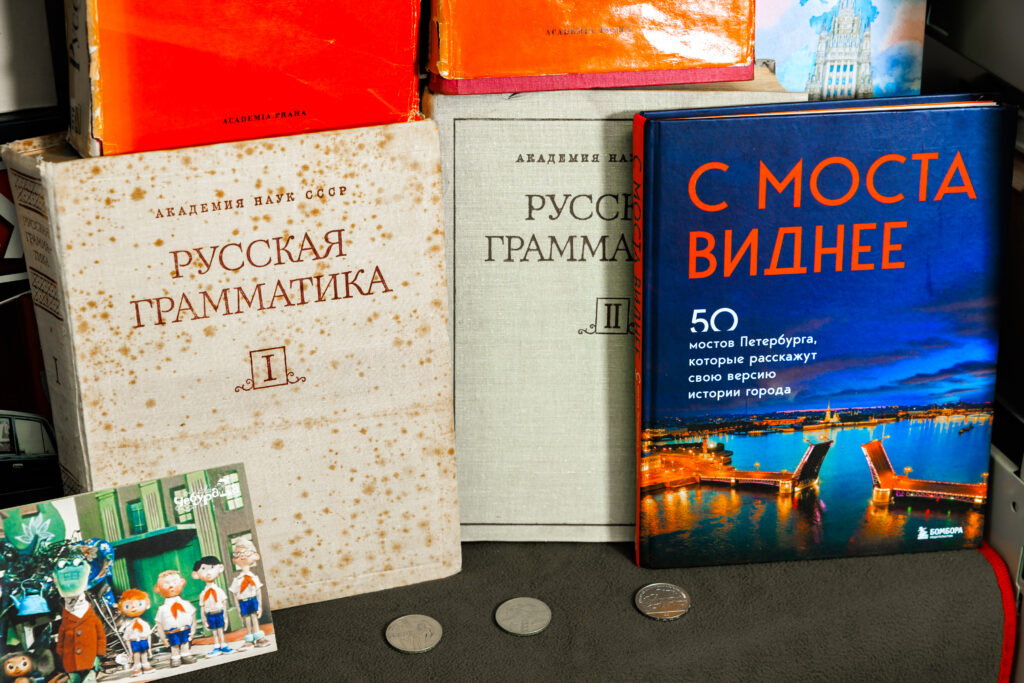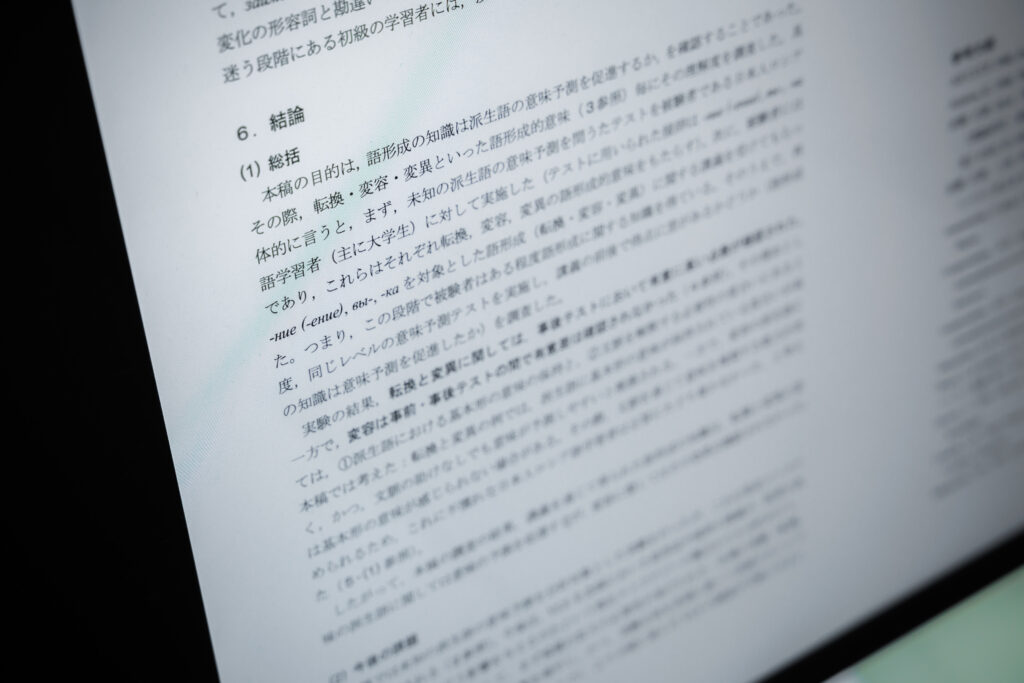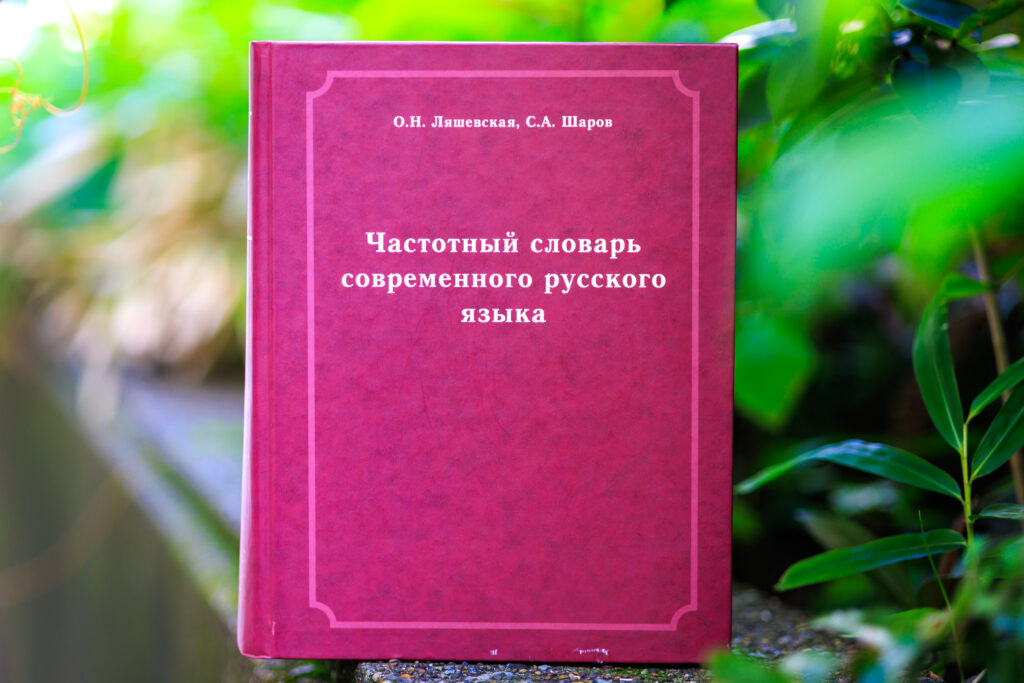
Associate professor Gota Sayama from the Faculty of Foreign Studies specializes in the Russian language. In parallel with theoretical research about the Russian language, he is currently undertaking empirical research about effective vocabulary learning from the perspective of applied linguistics.
In the learning of a foreign language, vocabulary is essential for building a foundation. However, with Russian, the changes in verbs and nouns are more complex than in English, making it relatively harder for Japanese people to learn this language. Inevitably, a lot of time is taken to learn the form of the language and it is hard for people to find time to learn vocabulary.
In my interactions with students learning Russian, I found that, currently, the lack of vocabulary hinders them during higher-level learning activities. I wondered if linguistics knowledge—such as word formation and morphology—can be applied to vocabulary learning. This was the starting point of my research.
Russian is a very distinctive language, where a new word is formed by adding an affix (such as a prefix or suffix) to a word. For example, the suffix “-тель” has the meaning of “person who does (something)” and adding it to the verb for “teach” turns the word into “person who teaches” or “teacher” while adding it to “write” has the meaning of “person who writes” or “writer.”
Having an understanding of such word formation allows one to guess the meaning of an unfamiliar word. It also enhances retention in memory and allows a person to effectively increase their vocabulary skills.
Analyzing the structure of words to increase vocabulary skills

Focusing on the structure of words and attempting to guess their meanings and retain them in memory falls under a method called vocabulary learning strategies and is thought to be effective in theory. However, practical research has not been conducted in Russian so far, and empirical research is being undertaken right now. Research has shown that these strategies may work in some cases but not others, depending on the type of word formation. This makes vocabulary learning in Russian difficult.
For example, when the word “играть”—which means “play”—is given the prefix “вы-” which means “out,” we get the derived word “выиграть.” However, what does it mean? Well, it means to “win.” Often, the meaning of this prefix is only taken as “outside,” but it actually has other meanings, and those meanings have to be considered when it is added to “играть.”
In this way, there are patterns which are difficult for Japanese learners of Russian to guess at meanings. I call this the transparency of meaning. There are differences in how accurately meanings can be guessed from the combination of a prefix and a base word. I feel it is necessary to analyze in greater detail the effectiveness in vocabulary learning.
Learning Russian is interesting because it is difficult to learn
In the first place, Russian has many words derived by adding affixes. According to a study, Russian has several times more affixes than English. The load on vocabulary learning is a factor that makes learning Russian difficult, but if you change your perspective, it can be said to be a field of study where its difficulty becomes an incentive to take on this challenge.
Another charm of learning a language is that the understanding of that country’s culture is deepened through research. Extending one’s interest into history, ethnic traits, and such will make learning vocabulary even more interesting.
Learning a foreign language is to broaden one’s perspective of the world. This is the same for me. After graduating from university, I joined an automobile manufacturer and applied the knowledge learned in university, with several experiences of being assigned to work in Russia and other Slavic countries. These experiences brought me to where I am as a researcher today. No matter what field you venture into in the future, vocabulary skills in a foreign language will definitely be useful.
My current goal as a researcher is to study effective learning methods for guessing meaning and memory retention and find an objective for my empirical research. With Japanese as my mother tongue, I believe there are approaches that only I can take, and I hope to discover effective methods for vocabulary learning that help people who are interested in the Russian language.
The book I recommend
“Частотный словарь современного русского языка”(A Frequency Dictionary of Modern Russian)
by О.Н. Лишевская and С.А. Шаpов, Азбуковник

This is a frequency dictionary of the Russian language compiled by Professor Olga Lyashevskaya, who taught me at the Russian Language Institute in Moscow when I was a graduate student. Frequently used words are categorized in fine detail by field. Besides basic theoretical research, I also keep it nearby at all times as an essential volume for my current empirical research.
-
Gota Sayama
- Associate Professor
Department of Russian Studies
Faculty of Foreign Studies
- Associate Professor
-
Graduated from the Department of Russian Studies, Faculty of Foreign Studies, Sophia University. Completed the master’s course in Language and Information Studies, Graduate School of Global Studies, Tokyo University of Foreign Studies followed by the graduate school’s doctoral course in Language and Culture Studies. Took on current appointment in 2018. Was at V.V. Vinogradov Russian Language Institute of the Russian Academy of Sciences from 2015 to 2016.
- Department of Russian Studies
Interviewed: July 2023